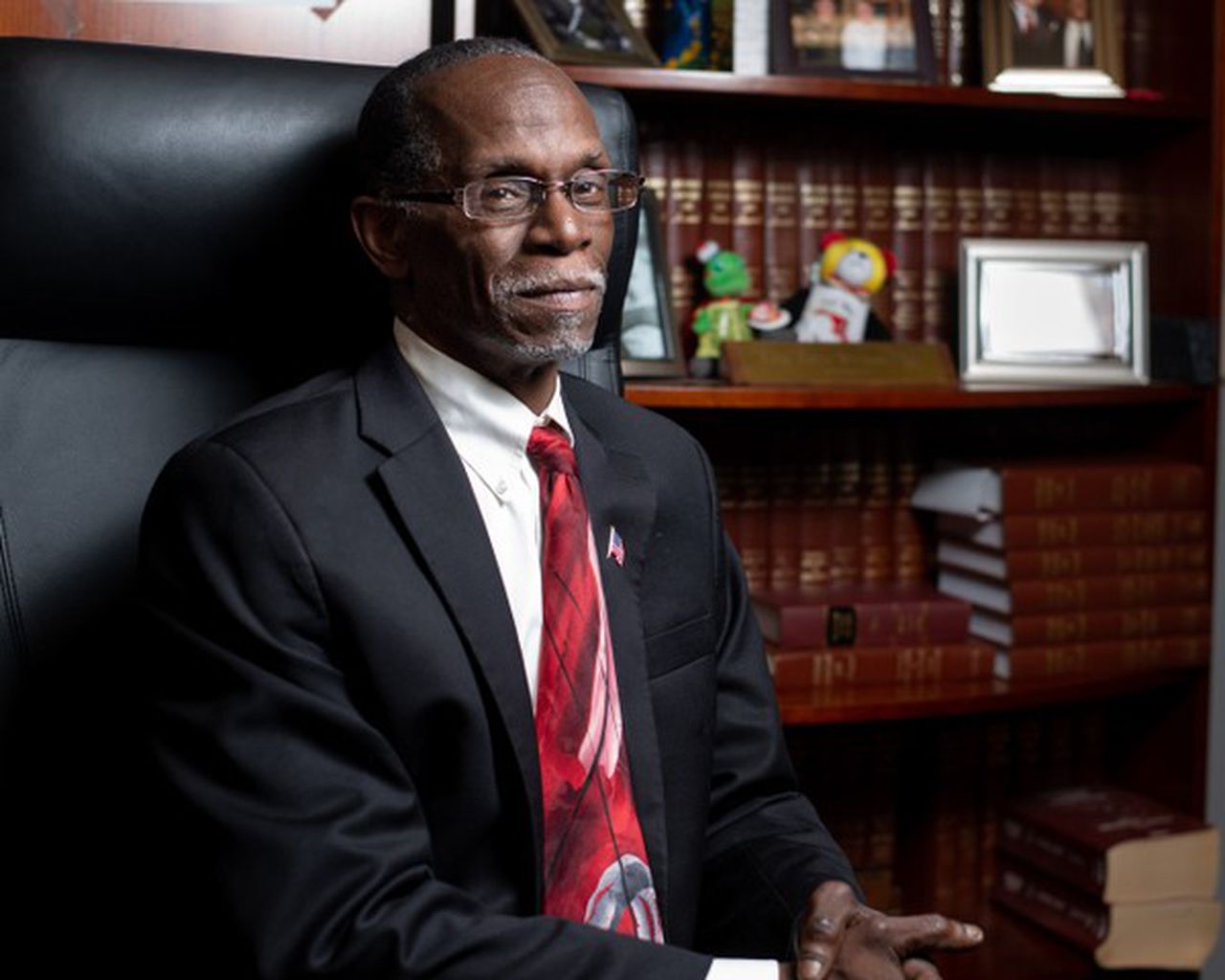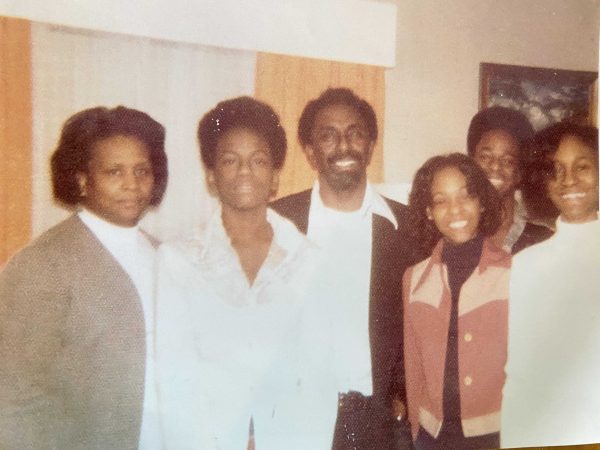
WCC part-time faculty, the Honorable J. Cedric Simpson, sits in his chambers | Courtesy of J. Cedric Simpson
A story of compassion, commitment, and community
by JAMES CASON
Deputy Editor
The DNA of WCC series welcomes The Honorable J. Cedric Simpson to the spotlight. Simpson, the first African American male to sit on a Washtenaw County bench, serves as a judge in the county’s 14A District Court and has been a part-time law professor at WCC for over 20 years. Simpson recently spoke with The Voice to talk about his connection and adoration for WCC’s institution and its people.
The Simpson family and WCC
Simpson’s earliest association with WCC is dated to the early ‘70s when he and his family moved from Detroit to Ann Arbor. His father, Willie J. Simpson, became a counselor at WCC. When Simpson occasionally went to work with his dad he remembers being fascinated by WCC’s one-building school.
“It was one building,” said Simpson. “It was a little cafeteria, and all of the offices were in the building. Everybody was in that building. The classrooms were all in that building.”
Simpson’s father was always found walking the college’s hallways. Young Simpson asked his dad why he rarely went to his office.
“My father said, ‘you can ask students to come meet you where you are, but you’re much more effective if you meet them where they are,'” said Simpson.
Simpson’s mother, Dorothy Jean Simpson, taught a class at the college and was instrumental in forming the school’s former daycare center, where she also worked. Simpson’s parents advocated for young mothers who didn’t have an opportunity at education; the daycare was a way to break that barrier. Simpson remembers his mother’s joyful moment.
“I can recall the pride in her face the day the center opened, and she was there,” said Simpson. “She would teach students who were part of the early education program because part of their curriculum was working in the daycare. So, in that way, she was also teaching them and contributing.”
Simpson’s youngest sister, Delphia T. Simpson is continuing the family legacy. She is currently the chief public defender of Washtenaw County and has just partnered with WCC to provide an internship opportunity for WCC students in the Public Defender’s office.

A vintage photo of the Simpson family. Left to right: Dorothy Jean (mom), J. Cedric (the Honorable), Willie J. (dad), Delphia (sister), Gary (brother), Karen (sister)| courtesy of J. Cedric Simpson
Simpson’s motivation to study law
Simpson was determined to be a veterinarian. That changed at age 13 when he was shot in the eye with a pellet gun by young kids in his Ann Arbor neighborhood. Simpson later had surgery.
“I watched him pump (the gun) 10 times. That thing was coming at me, and there was only about a neighborhood street width away from him,” said Simpson.
Simpson’s parents only desired an apology from the two boys: the owner of the gun and the shooter. They got one. The young man’s family who owned the weapon apologized, while the shooter’s family said he was never at the scene. Simpson’s parents hired an attorney. His case later went to trial and was settled.
“As I’m proceeding through the court process, I just became absolutely fascinated with the law. It was that experience that I knew this is what I wanted to do,” said Simpson.
From high school, to the bench, to WCC
Simpson lost his dad at age 16; his mom steered him and his three siblings through losing their father while also ensuring they went to college.
After graduating high school, Simpson attended the University of Maryland, Eastern Shore, a historically Black college. After that, he received a full-ride scholarship to The University of Maryland Law School and obtained a J.D. in 1986. Afterward, Simpson returned home.
“If you want to talk full circle, I come back, and the firm that hired me was the firm of the attorney that represented me when I was shot in the eye,” said Simpson.
Simpson practiced law for 13 years in Michigan and took the bench in 1999.
“I actually had more time (as a judge), oddly, than when I was a lawyer,” said Simpson. “So, I said, ‘I want to teach.’ I got in touch with the people that we knew at Washtenaw, and that’s how it all started for me – 22 years ago.”
What’s best about teaching at WCC?
Simpson raves about the diverse group of law students at WCC, who bring an exceptional experience to the classroom. He is honored to share his legal-professional knowledge with each of them. He has taught at law schools and EMU, but said, “Where I want to teach is Washtenaw.”
“It isn’t about the pay. It’s really about giving the students something that they normally would not get a chance to experience,” said Simpson.
While Simpson doesn’t view himself as anything special, his students do. They appreciate the opportunity to be taught by a judge.
“What he brings to the classroom is phenomenal. He is a gift to our students,” said WCC professor Ruth Walsh.
Simpson values talking to his students about their dreams, aspirations, and goals. He pushes them to do things they may not see as attainable.
“If I count it right, I think I have five students who are now lawyers,” said Simpson. “Each one of them, I can say I had hours of conversation about how they could do it and encouraging them to go ahead and do it.”
Two of Simpson’s previous students, now attorneys, have appeared in front of him in his courtroom. He talks about having flashbacks while watching them, seeing them back in his criminal evidence and procedures class, stumbling over objections.
“My eyes sort of well up – I’m just proud of them,” said Simpson. “They come up and thank me, but I thank them for just living out their dream. That’s the thing that means the most to me.”
The character and blessings of WCC
“There’s something special that happens at Washtenaw that doesn’t happen at other community colleges,” said Simpson. “It’s the philosophy of what we do with our students and how we treat those who are a part of that community. That is something that has not changed from those days in the ’70s when I was walking around the hallways with my dad up to now.”
Simpson recalls when his dad passed away. While en route from the church to the burial site, his father’s funeral procession drove onto WCC’s campus. The college had lowered the flag to half-staff.
“That showed the character of that institution,” said Simpson. “They took under their wing and made part of their family, this guy from Greenville, Alabama, who grew up on a farm. It meant enough to them that they would do this in his honor. I will be forever grateful.”


